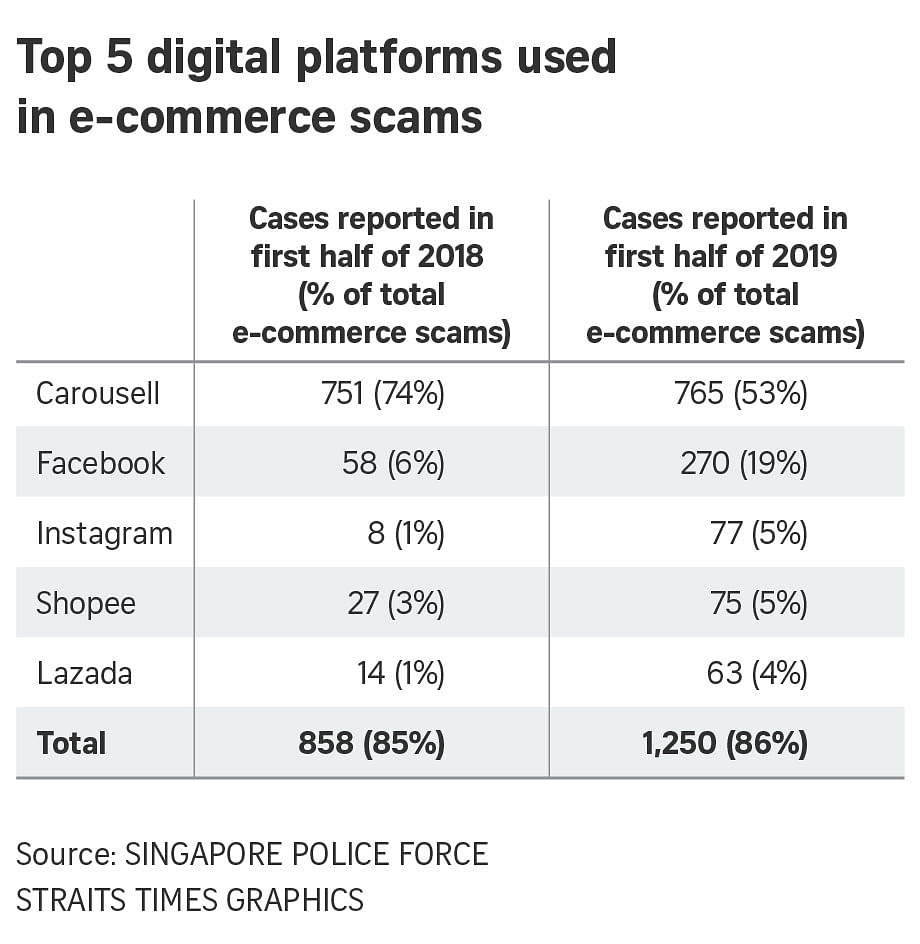More falling prey to scams, with e-commerce topping list
1,435 e-commerce cases in first half of year with $1.2m lost to scammers; overall crime up by 7%
Sign up now: Get ST's newsletters delivered to your inbox

Among the top 10 scams were e-commerce scams, loan scams, credit-for-sex scams and Internet love scams.
ST PHOTO: SHINTARO TAY
More people fell prey to scams in the first half of this year compared with the same period in the previous year, and this contributed to an overall increase in crime by 7 per cent from January to June, said police.
E-commerce, loan, credit-for-sex and Internet love scams made up 80 per cent of the top 10 scam types reported during the period.
The number of cases related to these four scam types increased by almost 60 per cent compared with the same period last year.
The number of loan scams more than doubled, from 315 cases and losses of $670,000 in the first half of last year to 692 cases and losses of $2.2 million in the same period this year. The largest amount cheated in a single case was $82,120.
Meanwhile, credit-for-sex scams also made a comeback, with the number of cases doubling from 209 in the first half of last year to 456 in the same period this year.
Victims lost $1.1 million in the first half of this year, compared with $464,000 last year. The largest amount lost in a single case was $80,000. In these scams, iTunes cards and Alipay remained the most common platforms used for money transfers.
E-commerce scams and Internet love scams also continued to mount.

The number of cases of e-commerce scams rose from 1,013 to 1,435 - the highest number reported among all types of scams. The total losses climbed from $870,000 to $1.2 million. The largest amount in a single case was $43,000.
About half of the cases took place on Carousell, a decline from the 74 per cent in the first half of the previous year. Common transactions on the platform that turned out to be scams involved the sale of electronic items, tickets, hotel room bookings and vehicle rentals.
However, there was a rise in the number of e-commerce scams on other digital platforms such as Facebook, Instagram, Shopee and Lazada.

The number of Internet love scams also rose, from 288 in the first half of last year to 306 in the same period this year. Victims lost a total of $17.1 million this year, compared with $11.7 million in the same period last year. The largest amount in a single case was about $2.4 million.
Other common scams in Singapore were related to investment ruses, business e-mail impersonations, China official impersonations, lucky draws, Facebook impersonations, and Immigration and Checkpoints Authority impersonations.
As scams are largely conducted by foreign syndicates based overseas, the police said they would continue to work with foreign law enforcement agencies to crack down on them. Police will also continue to issue scam prevention advisories together with the National Crime Prevention Council.
The public has been urged to exercise caution and due diligence before making any online transactions, as it is often difficult to recover monies that have been paid or transferred to scammers.
Apart from scams, the first half of the year also saw a slight increase of about 5 per cent in the number of molestation cases.
Statistics released by the police yesterday showed that in the first six months of this year, there were 837 such cases, 40 more than during the same period last year.
Such incidents on public transport went down but rose at bus interchanges as well as at LRT and MRT stations.
There was also an increase in the number of molestation cases in shopping malls, from 51 in the first half of last year to 67 during the same period this year.
The police said they would step up patrols in shopping malls and work with stakeholders to deter such crimes, but also reminded the public to stay vigilant while in crowded places.
"Victims of molestation are advised to make a police report as soon as possible. Reporting such crimes early is crucial in helping the police identify and arrest perpetrators," the police said.


